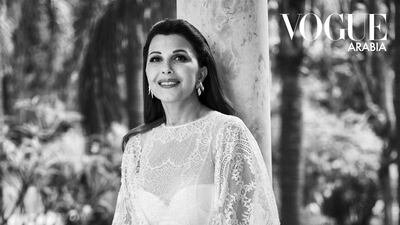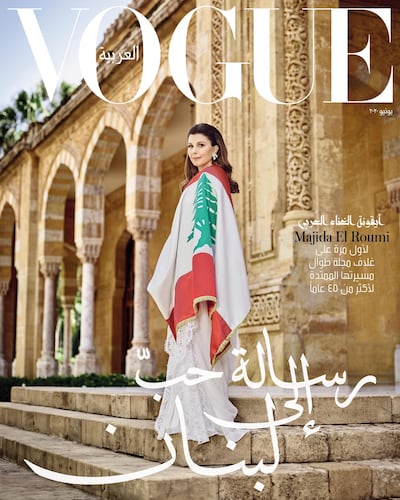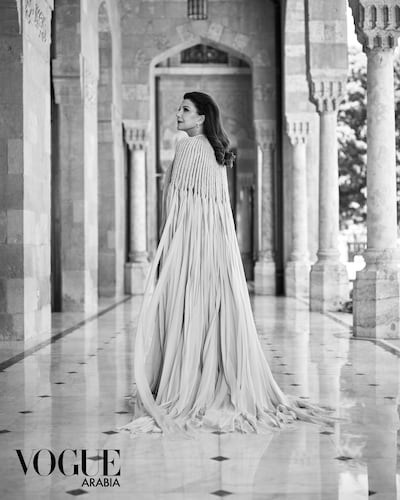To coincide with the launch of her latest song, Lebanese singer Majida El Roumi is appearing on the cover of Vogue Arabia's June issue, which is out next week.
Despite having a career that has spanned four decades, this is the first time that the enigmatic chanteuse has been photographed for a magazine cover.
"I did not pose for any magazine cover for more than 45 years. It didn't affect me," she states in her interview with Vogue Arabia. "An artist's prestige lies in making their fans long to see them perform. Recurrent appearances don't serve the artist, but rather make their presence mundane, in a way that will not impact people."
El Roumi is seen draped in the Lebanese flag in one version of the cover; in another, she champions the work of a fellow Lebanese creative by donning a red gown by Georges Hobeika.
In the interview, she speaks of the important role that artists can play as public figures. “The artist’s role is more important than a politician. An artist should call for unity, independence and freedom of his country. This is their true duty,” says Al Roumi, who is also a UN Goodwill Ambassador.
“I don’t care about material matters. What I care about is to stand by my human brothers, live their pain and wipe their tears. This is my true joy,” adds the singer, who performed the closing concert at this year’s Abu Dhabi Classics.
As the current pandemic adds to her country’s struggles, Al Roumi remains defiant. “I advocate for Lebanon to exercise sovereignty, dignity, and prestige on its land, and I call for confederation. Why shouldn’t there be a United States of Lebanon?”
The artist's latest song, Ghannou bi koll el loghat (Sing in all languages), is an ode to the times.
“Even if I said that I miss you, never say you will come to visit me,” she sings. "We have lost many days but the better is yet to come.
“Promise, when I will meet you you will stay locked down forever in my heart.”
Recognised as one of the Arab world’s most important artists, Al Roumi has built a career melding classical Arabic arrangements with modern and historical regional literature.
Her celebrated catalogue is marked by its various genres, from Arabic folk and sacred music to Mediterranean pop and arias. These influences not only arise from her background, but from a will to not have her career defined by popularity.
"I am not interested in any of that," she told The National in a 2015 interview at Morocco's Mawazine Festival. "The way that I see it is that life needs to have a balance. In Arabic music today, too much leans towards music that is entertainment. That is OK, but I feel that the artistry of it should be given some respect, too. Since the beginning, I have tried to approach my career that way."
Born to a Christian family in the southern Lebanese city of Tyre, El Roumi's talent and early popularity was shaped by the onset of the Lebanese Civil War.
After participating in the influential television talent quest Studio El Fan and winning a slew of music awards, El Roumi found initial success singing patriotic odes such as 1975's Am Behlamak (I'm Dreaming of You) and the 1976 debut album Albu Wadaa (Farewell).
Her debut magazine cover was was produced by an all-Lebanese team in the historic La Residence des Pins, Beirut. Photographer Sandra Chidiac and stylist Amine Jreissati capture El Roumi’s patriotic spirit as she wears pieces by renowned Lebanese designers.
It sets the tone for an issue that is dubbed “a love letter to Lebanon”, focusing on the country’s courage, spirit, strength and resilience, and highlighting the voices and work of creative forces such as filmmaker Nadine Labaki, musician Mashrou’ Leila, product designer Nada Debs and fashion designer Nicolas Jebran.
"We dedicated this issue to Lebanon with a true sense of mission – the revolution followed by the pandemic was catastrophic for the economy and society," says Manuel Arnaut, editor-in-chief of Vogue Arabia.





